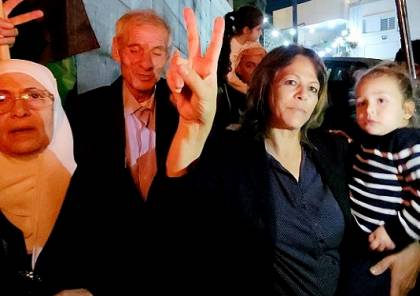A rally was organized on Minday’s evening to support the freedom of the sick prisoner, Walid Daqqa, 60, in his hometown of Baqa al-Gharbiya, while the prisoner was undergoing treatment in Barzilai Hospital, especially after a deterioration in his condition led to the removal of part of his leg. His lung died last week due to his suffering from myelofibrosis – a rare cancer that affects the bone marrow.
The march was preceded by a pause, with the participation of dozens of residents of Baqa al-Gharbia, freed prisoners, and a number of activists and solidarity with the prisoner Daqqa. The national captive movement (Al-Rabita) called for it on the eve of the Palestinian Prisoner’s Day, which falls on Monday.
The march started from the square of the Abu Bakr Mosque and interspersed with a short path in the city center, and banners were raised calling for the release of the prisoner Walid Daqqa, and some of them wrote: “Freedom for the prisoner Walid Daqqa”, “The occupation bears full responsibility for the life of the prisoner Walid Daqqa”, and “Walid Daqqa’s life is in danger.” “.
The march reached the house of the prisoner Daqqa’s family, where the flame of freedom was lit for the prisoner. After that, the head of the Prisoners’ Association at home, the released prisoner Munir Mansour, spoke, as he stressed the need to release the prisoner Walid Daqqa in order for him to receive the necessary treatment without restrictions.
The brother of the captive Walid, Asaad Daqqa, thanked everyone who participated and worked for the release of his captive brother, adding that “we are working to save the life of the captive Walid in every way, and he will be liberated and will persevere, especially since he taught us patience and struggle and will inevitably triumph over illness and the jailer.”
This march came at a time when activities and vigils are continuing to demand the freedom of the captive Walid Daqqa in the Palestinian territories, whether in the 48 areas, the occupied West Bank or the Gaza Strip.
On Sunday evening, a central event was also organized to commemorate the Prisoner’s Day in Al-Bireh in the West Bank, during which the flame of freedom was lit in honor of the prisoner Walid Daqqa, and all the sick prisoners to demand their freedom and the liberation of the bodies of the martyrs held in the refrigerators of the occupation, including the martyr prisoners.
Earlier on Sunday, a solidarity stand was organized with the prisoner Walid Daqqa in the town of Majdal Shams in the occupied Syrian Golan Heights, under the title “Man is a cause, comrades in the cause, comrades on the way to freedom”, at the initiative of the “liberated Syrian prisoners” group in the occupied Golan. .
In the context, the Commission of Detainees and Ex-Prisoners Affairs called on the entire world, with all its components, formations, bodies, and councils, to intervene immediately to end the arrest of the prisoner Walid Daqqa.
The head of the commission, Qadri Abu Bakr, condemned the shameful international silence towards Walid, who burned 37 years of the flower of his youth and age behind bars and in the cells and detention centers of the Israeli occupation, where he is exposed at these moments to a real medical crime that leads to the loss of his life at any moment.
The prisoner, Daqqa, has suffered successive health setbacks since last March, as a result of the crime of medical negligence, after he was diagnosed with myelofibrosis (a rare cancer that affects the bone marrow) on January 18, 2022, which developed from leukemia. ) that was diagnosed in 2015.
The prisoner, Daqqa, 60, from the town of Baqa al-Gharbia in the lands of 1948, has been detained since March 25, 1986, and he comes from a family consisting of three sisters and 6 brothers, noting that he lost his father during the years of his detention.
The prisoner Daqqa is considered one of the most prominent prisoners in the occupation prisons, and he contributed to many paths in the detention life of the prisoners, and during his long career in detention, he produced many books, studies and articles, and contributed cognitively to understanding the prison experience and its resistance.
It is noteworthy that the occupation imposed a life imprisonment sentence against him, which was later set at 37 years, and the occupation added two years to his sentence in 2018, to become 39 years, according to the Commission for Prisoners and Ex-Prisoners Affairs.

